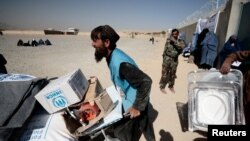The United Nations has warned that the Taliban's "unlawful" ban on its female staff in Afghanistan could push the world body to cease operations in the country.
The U.N. Assistance Mission in Afghanistan, or UNAMA, issued the warning Tuesday, days after the fundamentalist authorities barred Afghan women employees from working for the mission in the improvised nation reeling from years of war and prolonged drought.
The statement reiterated the U.N.'s "unequivocal" condemnation of the restriction, saying the global organization cannot comply with it as it is against international law and the U.N. charter.
"Through this ban, the Taliban de facto authorities seek to force the U.N. into having to make an appalling choice between staying and delivering in support of the Afghan people, and standing by the norms and principles we are duty-bound to uphold," the UNAMA stressed.
The mission's chief, Roza Otunbayeva, has initiated a review of UNAMA operations in the country that could continue until May 5, the statement said.
"U.N. national personnel — women and men — have been instructed not to report to U.N. offices, with only limited and calibrated exceptions made for critical tasks."
During the review period, the U.N. office in Kabul would conduct necessary consultations, make required operational adjustments, and accelerate contingency planning for all possible outcomes, the statement said.
"It should be clear that any negative consequences of this crisis for the Afghan people will be the responsibility of the de facto authorities," the UNAMA cautioned.
The Taliban have not publicly commented on the restriction since it went into effect a week ago (April 4).
The United Nations has nearly 4,000 staff members in Afghanistan, of which about 3,300 are Afghan nationals. Among them are about 400 Afghan women and 200 international female staffers.
The ban on U.N. female staff is the latest in a series of restrictions the Taliban have imposed on Afghan women since reclaiming control of the country in August 2021.
The curbs have severely impacted women and girls' participation in public and daily life. Afghan women have been banned from accessing higher education and many government jobs and public spaces. Girls are also not allowed to attend school beyond sixth grade.
On December 24, 2022, the Taliban banned Afghan women from working with domestic and international aid groups but did not include the United Nations at that time. Some international nongovernmental organizations suspended their work after the decree.
The de facto authorities have ignored calls to lift the curbs and dismissed criticism of their governance, saying it is in line with Afghan culture and Islamic law or Shariah.
The global community has refused to grant legitimacy to the men-only Taliban administration, primarily over human rights concerns and the treatment of women.
Meanwhile, the U.S. special representative for Afghanistan will travel to the region for weeklong meetings with officials in Qatar, the United Arab Emirates and Istanbul.
The State Department said Tuesday that Thomas West will also hold consultations with Afghan political leaders, journalists, humanitarian professionals and human rights actives in these countries.
“West is conducting outreach in the region to secure input as the international community seeks solutions to Afghanistan’s compounding challenges, made worse by the Taliban’s recent decisions to limit women’s participation in humanitarian operations and ban them from their vital work for the U.N.,” the statement said.
The United States and the international community at large have linked the legitimacy issue to the removal of restrictions on women and respect for human rights of all Afghans.
John Kirby, the White House National Security Council coordinator for strategic communications, reiterated to reporters last week that Washington does not recognize the Taliban as an official government in Afghanistan.
"If they want to be so recognized — at least by the United States — if they want to be seen as legitimate, then they need to own up to the promises they made about how they were going to govern that country and how they were going to treat their own people, including women and girls," Kirby told reporters last week.
Afghanistan is one of the world's largest humanitarian emergencies. The United Nations says 28.3 million people, two-thirds of the population, need humanitarian assistance.
Six million people are on the brink of famine. A $4.6 billion humanitarian appeal for this year is just over $200 million funded.









